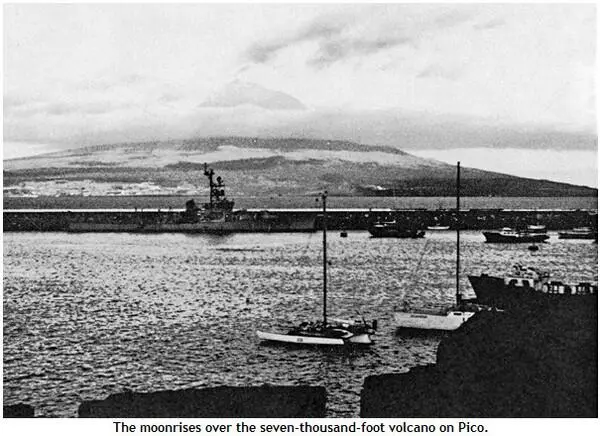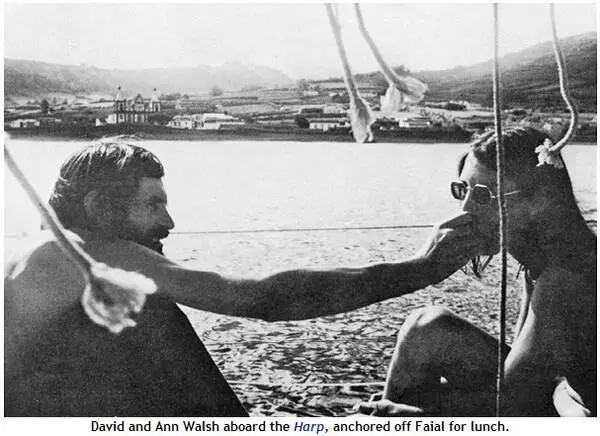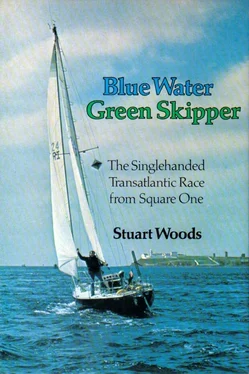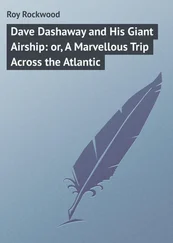When we came on deck for the trip ashore, Harp ’s dinghy was gone, in spite of the perfectly good clove hitch I had tied in the painter. It was now two o’clock in the morning, and we were faced with the choice of shouting until we woke some wine-soaked sailor on another boat and asking him to get up, dress, and row us ashore in the pouring rain, which had just begun to fall, or staying on the boat. The only sensible thing to do, of course, was to stay on the boat. It was all perfectly innocent, really it was; she stayed in her bunk and I stayed in mine. It is a mark of what dirty minds people have, however, that we took a great deal of raucous abuse the following day.
The dinghy was found, blown ashore at the other end of the harbor. I have never been entirely convinced that John Perry did not have a hand in the undoing of my perfectly good clove hitch. I do not think Martin would have stooped to such an action, but you can never tell about a London solicitor in a white suit and a straw hat.
The days drifted lazily by, with the odd bit of work getting done on Harp whenever mañana arrived. We continued to be royally entertained by the Club Naval. There was a special dinner at the Café Capitolia for the last boats to finish — Harp on real time, Peter, Peter on corrected time. Augie and Luis, the commodore of the club, always seemed to be inventing a reason for another special dinner. One day I expressed an interest in seeing some of the island, and a taxi materialized in front of the Estalagem for a free tour. Another time, while I was working on the boat, a motorboat came alongside bearing a bottle of the local brandy — another prize for the last boat to finish. There seemed to be no end to it all. John Perry threw a party on Peter, Peter, a fifty-foot catamaran which could have served as a floating dance hall. Brian Cooke looked around and remarked that there was probably room for a branch office of the National Westminster Bank.

Brian, who had suffered a bad fall from the top of the mast of Triple Arrow the season before, admitted that his broken back had not healed completely, but said that he was looking forward to the OSTAR the following season, and to his winter project of attempting to beat Chichester’s speed record from West Africa to South America, on which he would qualify his new boat for the OSTAR. There was an impromptu dinner with Mike Best of Croda Way and David Palmer of FT and his lovely wife, Elizabeth. Mike and David were both, as I was, sailing back from the Azores single-handed to qualify, and we had an interesting chat about preparing for the race.
Scrimshaw, etching on whale ivory, is the Azorean art form, and Orthon is its chief practitioner in Horta. Working in a small house crammed to the rafters with whales’ teeth and other bones and a great deal of ingenious machinery, most of which he made himself, Orthon, for a modest sum, will engrave the image of a yacht on a polished tooth and mount it. Each competitor was presented with a tooth engraved with the name of his yacht, and these handsome gifts no doubt grace bulkheads in widely scattered places today.
As the week passed, yachts began to sail for England. First to go was Gypsy Moth, and she got a send-off of fireworks and hooters. Before leaving for home, Bill Howell laid me out in the cockpit of Tahiti Bill, injected me with a painkiller from my medical kit, and reglued a loose bridge which had been rattling around the back of my head since Portsmouth. Bill King found a berth with him for the sail back. The other boats followed one by one, until only Runnin’ Scared and Harp were left. I saw a lot of David and Ann Walsh, who were sailing Runnin’ Scared back, and they planned a trip to Ireland in the autumn, when we would cruise down the south coast. Most days we took Harp along the coast from Horta and anchored for a picnic and a swim. In the evenings, Ann formed the diverting habit of suddenly shedding her clothes and dashing into the pool at the hotel on the hill, while the ancient night watchman railed at us. I was sad when Runnin’ Scared sailed out of the harbor and left me to enjoy Horta on my own.
But other boats were arriving all the time, Horta being a prime stopover for yachts on transatlantic passages: Charisma and Tenacious, both members of the American Admiral’s Cup team in the recent Cowes Week, came and went; two Canadians sailed in aboard a homemade catamaran; an American couple arrived on a lovely little cutter which sported a square rigged sail; a couple who had briefly been neighbors at Coolmore while building a boat at Crosshaven came in on their way to Brazil; and we all watched with bated breath as the pilot boat took a giant, seventy-five-foot ketch in tow just before she drifted onto some rocks, her engine seized and her sails blown out in a gale. She was Polaris, a handsome if weathered old boat, built in Germany in 1914, sailed by a very mixed crew which included an English bank manager turned fisherman turned boat bum, a couple of pretty girls, and a mad Irish skipper. They were great fun for the rest of my stay and, at last report, Shay, the skipper, and Tim, the fisherman/bank manager, were still in Horta, running a discotheque.
An American ex-marine and now merchant marine radio operator named Bob Lengyl turned up in Prodigal, a tiny sloop, and nearly worried himself to death when I told him that the race committee was closing the entry list for the OSTAR. He had been preparing for the race for two or three years but had neglected to reserve a place. He got an application in the mail, pronto.
One of the most interesting people to sail into Horta was Laurie, a wiry Aussie with an impenetrable accent and a wide gap between his teeth. He had a story to tell about that. Leaving Virginia Beach, in the United States, for Horta, he had been caught in a hurricane, then come down with an abscessed tooth. Unable to stand the pain, he had sloshed down some whisky, then taken a drill and a self-tapping screw to the roots of the tooth, when it had broken off in attempts to pull it with vice-grip pliers. While he was lying semiconscious in his bunk recovering from that, a supertanker nearly ran him down, scraping his little boat along the entire length of the huge ship’s hull and pulling out his mast and most of his stanchions. He had restepped the mast and repaired his rigging at sea, then sailed on to Horta.

Laurie and Len, one of the Canadians, gave me a great deal of help with getting Harp ready to sail again, especially with the electrical system, which was performing very poorly. Len had a complete electrical tool kit aboard his boat and worked wonders with a soldering iron.
The people at the Estalagem were interesting, too. A writer and photographer from National Geographic turned up, doing a story about the Azores, especially about the whale hunting. Then Perry Mason turned up at the bar one afternoon. Or was it Ironside? Raymond Burr, the actor, for reasons I never quite got straight, owned the lease of the government-built Estalagem. It was very peculiar, at breakfast or dinner, to look up and see Perry Mason/Ironside across the dining room. He gave a reception one evening and is a charming man.
My stay in Horta was stretching pleasantly on, my chief excuse being the nonarrival of the new Dynafurl. There had been some confusion about when and where it was to be sent, and an exchange of telegrams was required before I was notified that it was on its way. Augie and Luis took over from there. They somehow arranged for the pilot of the flight from Lisbon to the Azores to collect the package in Lisbon, then pass it on to the pilot of the interisland flight, thus saving several days in shipment. Augie then walked me through most of the Azorean Civil Service in order to save me paying exorbitant duty on the gear, which was being almost immediately re-exported anyway.
Читать дальше














